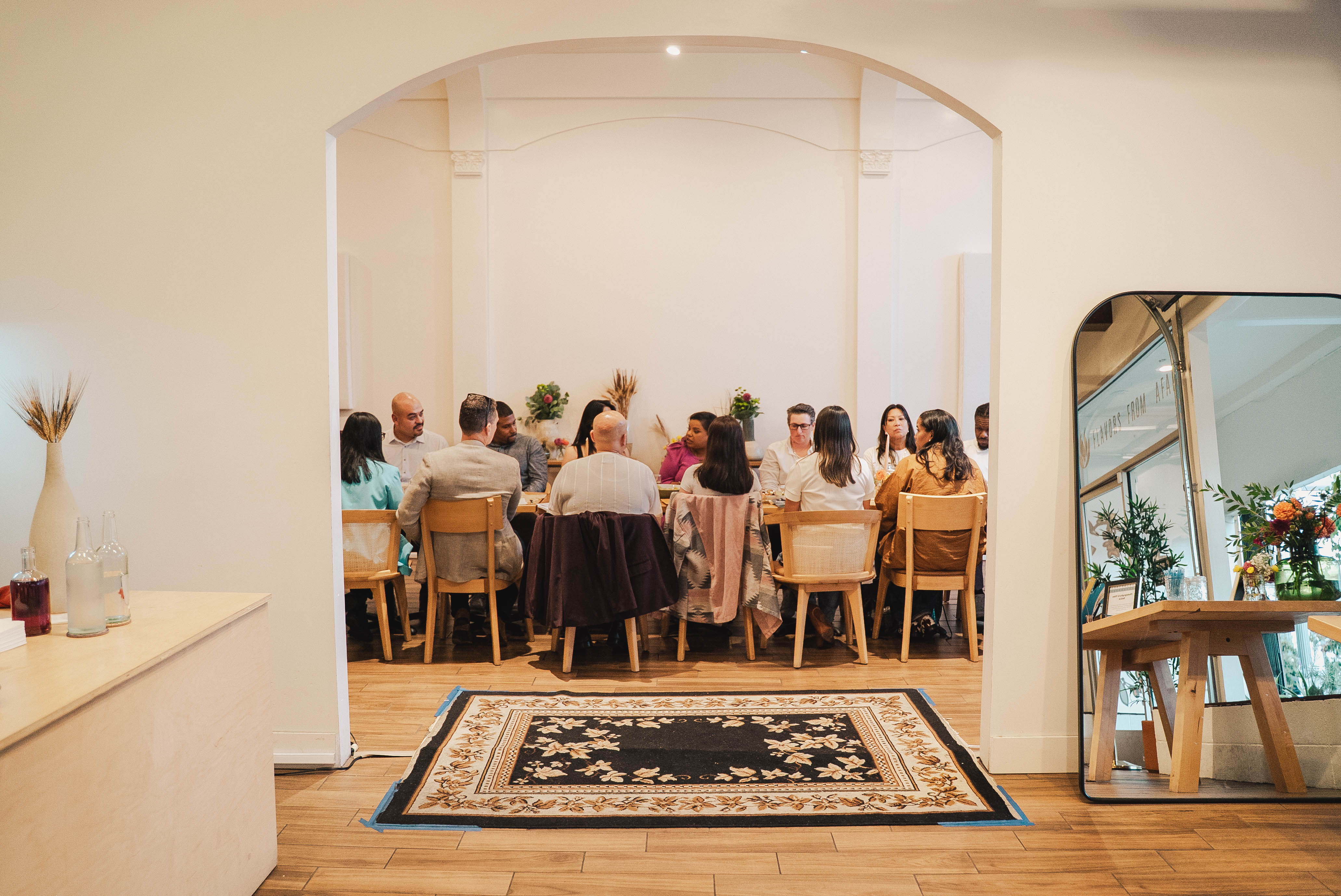At Next Shift Learning, we design learning experiences grounded in real-world practice that blend emotional intelligence, inclusion, and adaptability enabling leaders to show up with care, clarity, and courage.
On July 31, we took that approach one step further by inviting 27 bold, curious leaders from across tech, entertainment, gaming, and the arts to join us for a night of honest conversation.
We were honored for the opportunity to host everyone at Flavors from Afar, a mission-driven space that celebrates the stories and food of refugee and asylum-seeking communities. The space set the tone for a night grounded in humanity and shared purpose.
This wasn’t a typical industry mixer, but instead an invitation for everyone to pause, reflect, and come together around a single important question: What kind of leadership are we hungry for right now?
Over shared plates, attendees engaged in vulnerable and courageous conversations. While the topics were vast and evolved throughout the night one thing became clear:
The future of leadership isn’t about doing more or working faster with tools. It’s about unlocking our potential, building confidence, and connecting with ourselves and our teammates in ways that honor and celebrate our humanity.
Below are the four main themes that resurfaced throughout the night’s conversations.
1. From Performance to Presence
Leaders are craving space to be real, not polished.
Sony Das, VP of L&D at Lionsgate, connected leadership practices at work and home, naming emotional regulation and deep listening as essential skills that transcend contexts. Around the table, leaders discussed how exhausting it’s become to perform leadership. The expectation to always appear confident, composed, and in control has taken a toll, while AI disruption, emotional burnout, and team restructuring have left many looking for more than strategies.
The hunger now is for leaders who can be present, not perfect.
What we heard:
- A desire to lead teams of all sizes with clarity and care, not just confidence
- The challenge of staying real and authentic while also maintaining visibility
- A hunger for psychological safety, not perfection
2. Trust Is the Strategy
Not soft. Not optional. Absolutely critical.
"Trust grows when we celebrate risk-taking and even failure.”
— Jourdan Sutton, Director, Global Knowledge & Skills, Google
In 2025, tighter budgets, faster pivots, and remote teams have made one thing clear: trust isn’t a bonus. It’s a baseline. Without it, the best strategies collapse under pressure.
But trust isn’t a single action or one-time fix. It’s layered and lived. It shows up in small moments, such as in how we onboard new teammates, how we name uncertainty, and how we respond when things go wrong.
The companies that are thriving aren’t the ones moving the fastest. They’re the ones where people feel safe enough to move forward together.
What leaders shared:
- Building trust among members of hybrid teams is harder and more urgent
- Onboarding isn’t just about sharing knowledge; it’s about creating a feeling of belonging among team members
- Managers need better tools to rebuild trust when it breaks
Trust, they agreed, is built in the everyday moments when leaders are transparent about uncertainty, willing to admit mistakes, and intentional about making others feel they belong.
3. AI Adoption Requires Increased Emotional Intelligence
The conversation about AI wasn’t about the tech itself as much as the people using it. Leaders around the table shared how the rise of AI is already reshaping what matters most in their roles.
- Alex Laurs (Ernst and Young) likened skill-building with AI to his time as a volleyball player—success depends less on hours logged and more on how you learn, retain, and apply skills.
- Michael Tristan (Motive), a self-described futurist, talked about using AI coaching to keep a growth mindset and “not lose the edge” as technology evolves.
- Jessica Salinas (New Media Ventures) surfaced concerns about bias, asking what it means to design AI that is available and responsive for Black and Brown communities whose realities aren’t always represented in training data.
- Laura Cadranel (Stealth Startup) pointed to AI’s potential to fill gaps caused by “learning fatigue,” freeing leaders to focus more on creativity and connection.
What emerged from this exchange was a shared understanding: AI may change the work, but it doesn’t replace the human responsibility to connect, lead with care, and navigate complexity with emotional intelligence.
4. Reflection Is a Leadership Practice
Slowing down isn’t indulgent. It’s essential.
One of the most powerful parts of the evening came during a round of journaling. We asked attendees to engage in a period of quiet reflection. It wasn’t flashy. It was focused. It was personal. And it revealed how rare that kind of quiet reflection is for most leaders.
What surfaced:
- The realization that leadership doesn’t always require knowing; it requires noticing
- An appreciation for a protected space to process and share
- A reminder that learning doesn’t just come from doing; it comes from reflecting
The takeaway was clear: reflection isn’t just for learning. It’s for reconnecting with purpose when the noise of leadership threatens to drown it out.


Shifts We See Coming
The themes that emerged during the evening didn’t just reflect where leaders are now, they hinted at where leadership is shifting:
Remote & Distributed Teams Will Demand New Kinds of Trust
In-person osmosis is gone. Leaders will need to design teams that foster alignment—intentionally, consistently, and across cultures and time zones. That means rebuilding rituals, rethinking onboarding, and redefining accountability.
Reflection Will Become a Productivity Strategy
As cognitive overload rises, the ability to slow down, both individually and as a team, will be a competitive advantage. Personal reflection won’t be framed as “soft” or “optional.” It’ll be required to focus, adapt, and make good decisions.
Leaders Will Need Space for Collective Processing
The AI era, political uncertainty, and attacks on inclusion will continue to test leaders’ clarity and resilience. The leaders in our room didn’t just share strategies, they processed hard moments together. Creating spaces for teams to acknowledge and work through fear, loss, and change will be as critical to performance as any business plan.
The Leaders Who Will Thrive
In the coming years, the best leaders won’t be the ones with the right answers. They’ll be the ones who create the conditions for honest reflection, adaptive learning, and resilient trust.
Companies that future-proof their leadership strategy now by building cultures of care, clarity, and shared responsibility will be the ones best positioned to thrive through whatever comes next.

What Comes Next
This was one evening. But for many of us, it sparked a shift.
And that’s the point.
At NSL, we design leadership experiences rooted in real-world tension and reflection. From executive coaching to emerging leader cohorts, we help teams build trust, deepen emotional fluency, and lead with clarity in times of change.
We believe when minds and hearts shift, the future does too.
If this resonates:
- Let’s connect. Book a call →
- Get future insights. Subscribe to our newsletter →
- Share the shift. Forward this to someone who leads with heart. ❤️





